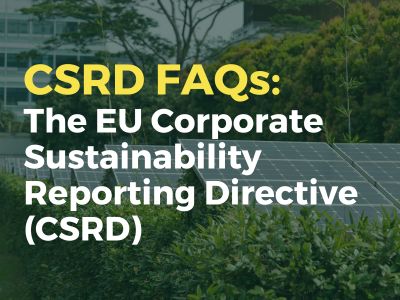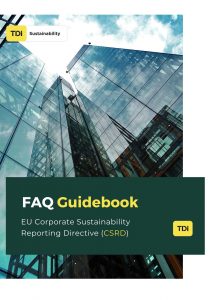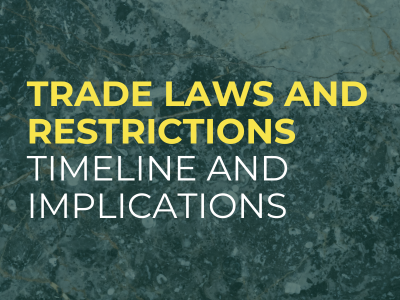
CSRD FAQs: The EU Corporate Sustainability Reporting Directive (CSRD)
The EU is set to increase corporate transparency and accountability through mandatory ESG disclosure under the Corporate Sustainability Reporting Directive (CSRD). The Directive focuses on corporate non-financial-related disclosure, which replaces the previous Non–Financial Reporting Directive (NFRD). Under the Directive, starting in 2025, more than 50,000 companies will be required to disclose information on their environmental, social and governance (ESG) practices.
The EU rules will require large listed companies – including subsidiaries of non-EU companies and SMEs to regularly report on ESG-related risks and opportunities and disclose company impacts on people and the environment by reporting against specific performance metrics.
Additionally, companies will be required to provide disclosure of the following:
– ESG policies and processes in place.
– Due diligence mechanisms specifically covering ESG issues (including supply chain due diligence).
– ESG targets incorporating ESG objectives and metrics to support the EU’s decarbonisation efforts.
The disclosure requirements under CSRD will support access to ESG information by consumers, civil society organisations, investors and other stakeholders, enabling them to assess and evaluate companies’ sustainability approaches by assessing their ESG performance.
What are the specific requirements for companies under the CSRD?
The CSRD introduces the ‘double-materiality’ requirement: a two-fold requirement for companies to identify and assess environmental and social impacts deriving from companies’ business activities, while evaluating the financial impacts of environmental and social risks on business operations.
To address reporting comparability and consistency issues previously raised by the NFRD, the new disclosure regulation requires companies in scope to adopt a single reporting standard, namely the European Sustainability Reporting Standards (ESRS). These standards were developed by the European Financial Reporting Advisory Group (EFRAG), the multi-stakeholder advisory group appointed by the EU Commission to advise on adopting international reporting standards for EU regulations. The EFRS incorporates requirements from the Global Reporting Initiative (GRI) and SASB (ISSB), as well as climate-specific reporting requirements such as the ones included in the Task Force on Climate-related Financial Disclosure (TCFD).
Under the CSRD, independent third-party verification of the information disclosed will be mandatory to support the reliability and robustness of the information provided. Furthermore, companies will be required to incorporate their ESG disclosure in their financial reporting. Specifically, non-financial disclosure requirements defined by the CSRD will need to be included in the management report.
How can TDi help companies navigate CSRD requirements?
Our team of experts can offer valuable insights, industry knowledge, and practical solutions to help clients proactively address the evolving regulatory landscape. TDi has extensive experience in sustainability reporting – including climate-specific reporting – across a wide range of sectors, from minerals and metals to luxury and fashion, governments and standard-setting organisations.
TDi Sustainability can assist clients in aligning and complying with the CSRD, including by:
– Assisting with developing and implementing a robust internal data collection system by developing specific Standard Operating Procedures (SOPs).
– Supporting internal data collection processes by engaging with data owners and coordinating internal communications to ensure information required under CSRD is rightly collected and reported in line with EU regulations.
– Supporting the adoption of ESG policies and practices and the development of ESG targets and metrics, including decarbonisation efforts.
– Reviewing, developing and improving due diligence systems to identify ESG risks and opportunities alongside the company operations and within its value chain.
– Supporting companies undertaking ESG multi-stakeholder initiatives and related reporting requirements.
Download the CSRD FAQ guidebook to find out how this Directive may impact your business, and contact us to discuss how TDi can support your company in preparing for the CSRD.
Download the free CSRD Guidebook
Our free CSRD Guidebook covers a host of frequently asked questions in detail to help you navigate this critical transition.
Download the pdf to enrich your knowledge of the Corporate Sustainability Reporting Directive and prepare for impending changes in your business operations now.




